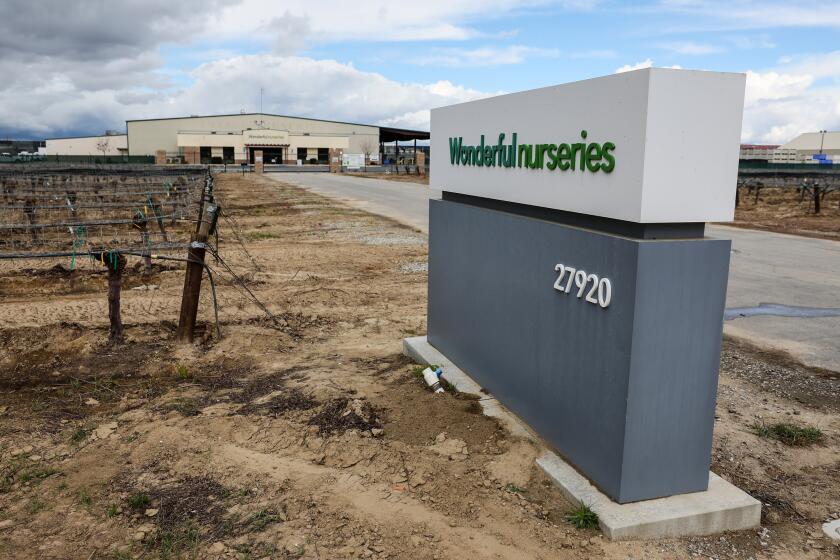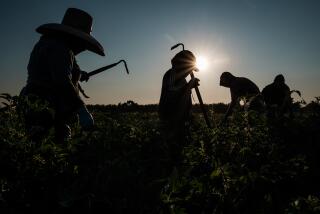Negotiations between farmworkers and Wonderful Co. can continue, appellate court rules

In the latest update in a dispute over a campaign to unionize workers at a powerful Kern County agricultural company, a California appellate court has ruled that negotiations can continue between the state’s largest farmworker union and Wonderful Co.
The two parties had been forced to pause bargaining following a lower court’s ruling.
The ruling Thursday by a three-judge panel follows an appeal by the Agricultural Labor Relations Board, the state agency that oversees agricultural union elections, and the United Farm Workers, which is representing farmworkers who voted to unionize at a Wonderful nursery this year.

The board and UFW argued that the bargaining and administrative proceedings should continue while the Court of Appeal further examined the case.
Wonderful Nurseries, the nation’s largest grapevine nursery, is in Wasco, Calif. Its parent company, Wonderful Co. — a $6-billion agricultural powerhouse owned by Stewart and Lynda Resnick — sued the Agricultural Labor Relations Board in May, challenging the constitutionality of the state’s so-called card-check system, which Gov. Gavin Newsom signed into law in 2022.
The outcome of the fight between Wonderful Co.’s wealthy owners and California’s storied farmworker union will shape the future of a divisive new process for unionizing agricultural job sites.
Under the law, a union can organize farmworkers by inviting them to sign authorization cards at off-site meetings without notifying their employer. Under the old rules, farmworkers voted on union representation by secret ballot at a polling site designated by the state labor board.
Union organizers had pressed for the card-check law, contending the secret ballot process, typically held at job sites, left workers fearful of retaliation from employers.
In late February, the UFW filed a petition with the labor board asserting that a majority of the 600-plus farmworkers at the nursery had signed union authorization cards, and asking to be certified as the workers’ union representative.
Within days, Wonderful accused the UFW of having baited the employees into signing the authorization cards under the guise of helping them apply for $600 each in federal relief for farmworkers who labored during the COVID-19 pandemic. The company submitted nearly 150 signed declarations from nursery workers saying they had not understood that by signing the cards they were voting to unionize.

The UFW countered that Wonderful had intimidated those workers into making false statements and had brought in a labor consultant with a reputation as a union buster to manipulate their emotions in the weeks after they signed the cards.
But Wonderful, whose portfolio includes such brands as Fiji Water and Pom Wonderful, sought to challenge the certification of the election results and challenge the state law, which would force it into bargaining negotiations. The company alleges in its lawsuit that the law deprives employers of due process on multiple fronts, including by forcing a company to enter a collective bargaining agreement even if it has formally appealed state labor board certification of a union vote and presented what it believes is evidence that the voting process was fraudulent.
In July, Kern County Superior Court Judge Bernard C. Barmann Jr. sided with the company, saying Wonderful “was likely to prevail” in its legal challenge to the state’s relatively new system for organizing farmworkers and faced irreparable harm if United Farm Workers were allowed to pursue a bargaining agreement on behalf of Wonderful’s nursery workers before the case was decided.
In a September petition to the California 5th District Court of Appeal to lift the injunction that paused the proceedings, state Atty. Gen. Rob Bonta, on behalf of the Agricultural Labor Relations Board, said the Superior Court “had no role to play” by issuing the injunction and instead ignored the already established process to review the certification.
“The injunction threatens irreparable harm to Petitioners, impacted agricultural workers, UFW, the integrity of the administrative review process established by the Legislature, and even Wonderful itself,” Bonta wrote.
In a separate petition, lawyers for the UFW argued that the union and the farmworkers it represents would face irreparable harm if the preliminary injunction was not stayed pending appeal. They said that the injunction was delaying the completion of the hearing before the state labor board, and that 150 witnesses remained to be called.

“Because farm labor is seasonal, high-turnover work, many farmworker witnesses will be unavailable by the time appellate proceedings conclude,” the UFW said. “Witnesses who can be located will have faded recollections of important events and details. If left in place, the preliminary injunction will prevent UFW from putting on its full case defending itself against the Company’s accusations of misconduct.”
The UFW said staying the preliminary injunction pending appeal would not cause irreparable harm to Wonderful, noting the company could still prevail in the board’s administrative hearing.
Elizabeth Strater, national vice president and director of strategic campaigns for the UFW, said the ruling was “certainly welcome.”
“We are motivated to get the ALRB hearings resumed so people can come forward and talk about the tactics they encountered at the hands of their employer’s agents,” Strater said.
Wonderful Nurseries said in a statement: “This procedural order does not change the Superior Court’s previous determination that the Card Check is ‘likely unconstitutional.’ We continue to welcome a swift determination by the State Court of Appeals on that constitutional question and fully expect their decision will be the same as the initial one made by Judge Barmann.”
More to Read
Sign up for Essential California
The most important California stories and recommendations in your inbox every morning.
You may occasionally receive promotional content from the Los Angeles Times.













